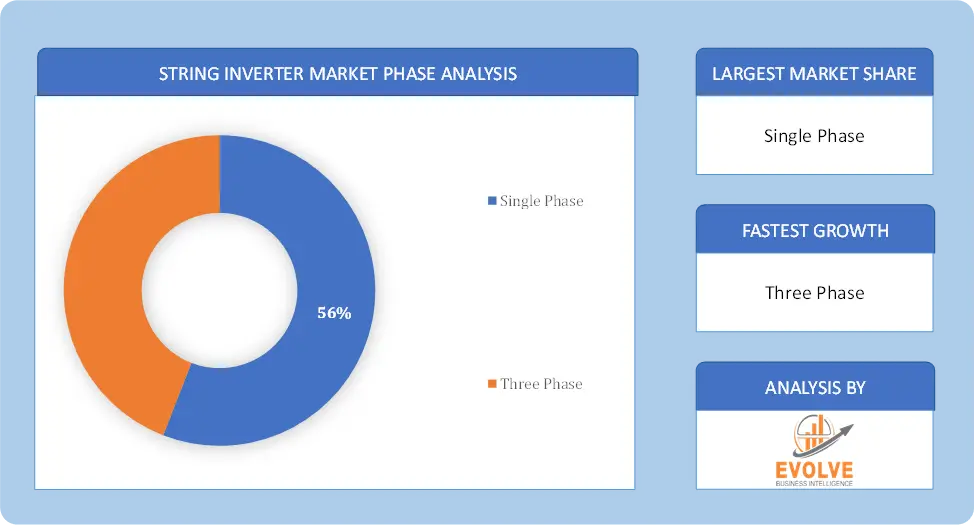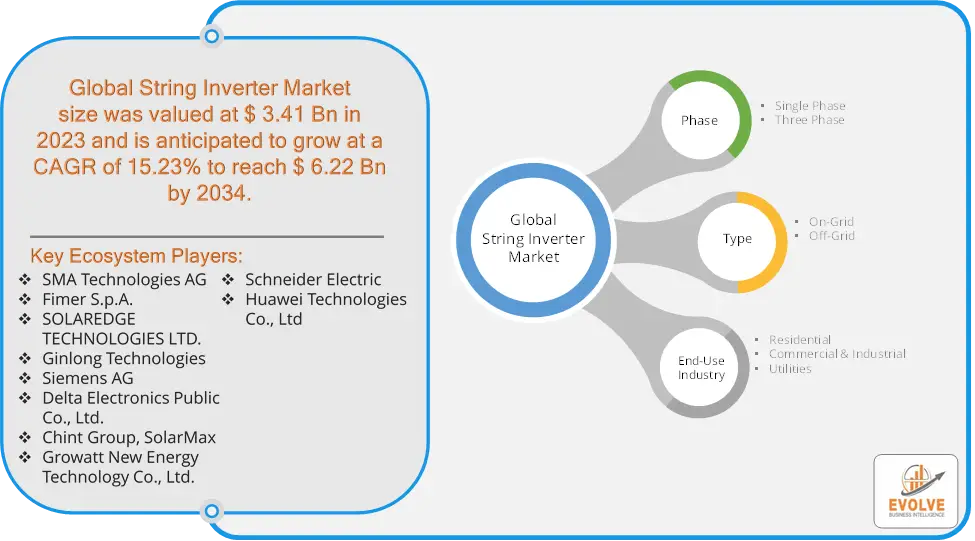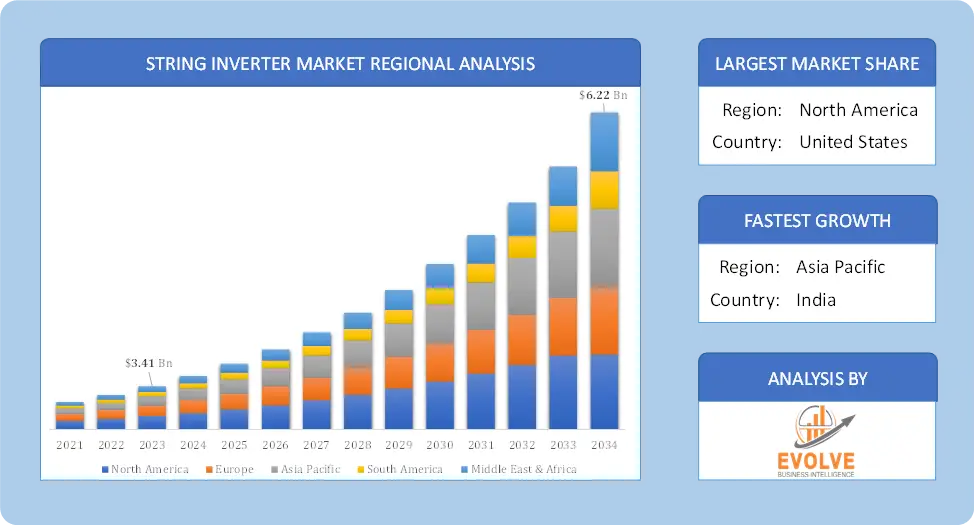String Inverter Market Analysis and Global Forecast 2021-2034
$ 1,390.00 – $ 5,520.00Price range: $ 1,390.00 through $ 5,520.00
String Inverter Market Research Report: By Phase (Single Phase, Three Phase), By Type (On-Grid, Off-Grid), By End-use Industry (Residential, Commercial & Industrial, Utilities), and by Region — Forecast till 2034
Page: 116
String Inverter Market Overview
The String Inverter Market size accounted for USD 3.41 Billion in 2023 and is estimated to account for 3.99 Billion in 2024. The Market is expected to reach USD 6.22 Billion by 2034 growing at a compound annual growth rate (CAGR) of 15.23% from 2024 to 2034. The market for solar inverters that uses string inverters to change solar panels’ direct current (DC) into alternating current (AC) for grid or local consumption is known as the string inverter market. Small to medium-sized solar setups that use several panels connected in series (or strings) to the inverter are the usual applications for string inverters. Due to their affordability, simplicity of installation, and dependability, these inverters are recommended for use in both residential and commercial solar systems. Growing installations of solar power, the need for renewable energy, and improvements in inverter technology are the main factors propelling the industry. Modern monitoring methods help to prevent issues such as shading sensitivity and lower efficiency in complex installations.
Global String Inverter Market Synopsis
 Global String Inverter Market Dynamics
Global String Inverter Market Dynamics
The major factors that have impacted the growth of String Inverter are as follows:
Drivers:
⮚ Advancements in Solar Inverter Technology
Continuous innovations in inverter technology have enhanced the performance and reliability of string inverters. Features such as Maximum Power Point Tracking (MPPT), smart monitoring, and grid interaction have significantly improved the overall efficiency of solar PV systems. These advancements make string inverters more adaptable to various installation conditions, even in partial shading or non-ideal panel orientations, thus expanding their application scope.
Restraint:
- Declining Prices of Alternative Energy Storage Solutions
The market for string inverters faces both opportunities and problems as a result of the increased interest in energy storage technologies, such as battery systems. Although hybrid string inverters that work with storage systems are popular, some customers might choose more sophisticated inverters or microinverter systems made especially for battery integration because battery systems are becoming more and more affordable. String inverters may see more competition as battery prices continue to drop, especially from consumers looking to achieve energy independence through off-grid or hybrid options.
Opportunity:
⮚ Technological Innovations in Power Electronics
String inverters’ efficiency and functionality are constantly being enhanced by developments in power electronics. Wide-bandgap semiconductors, improved cooling technologies, and multi-level inverters are some of the innovations that are making string inverters more dependable and efficient—even under harsh climatic circumstances. These enhancements lessen energy loss, boost system dependability, and need less maintenance. String inverters will face increased competition from alternative inverter solutions as these technologies advance, giving manufacturers a chance to take a bigger chunk of the expanding solar market.
String Inverter Market Segment Overview
By Phase
 Based on the Phase, the market is segmented based on Single Phase, Three Phase. the Three Phase segment dominates, particularly in commercial and industrial applications, due to its ability to handle larger power loads and provide greater efficiency in energy distribution compared to single-phase systems.
Based on the Phase, the market is segmented based on Single Phase, Three Phase. the Three Phase segment dominates, particularly in commercial and industrial applications, due to its ability to handle larger power loads and provide greater efficiency in energy distribution compared to single-phase systems.
By Type
Based on the Type, the market has been divided into On-Grid, Off-Grid. the On-Grid segment dominates, primarily due to the widespread adoption of grid-connected solar systems that benefit from net metering and government incentives, making them more economically viable for residential and commercial users.
By End-use Industry
Based on End-use Industry, the market has been divided into Residential, Commercial & Industrial, Utilities. the Utilities segment dominates due to the large-scale adoption of solar power plants and utility-scale solar projects, driven by the increasing demand for renewable energy in the grid.
Global String Inverter Market Regional Analysis
Based on region, the market has been divided into North America, Europe, Asia-Pacific, the Middle East & Africa, and Latin America. The area of North America is anticipated to dominate the market for the usage of String Inverter, followed by those in Asia-Pacific and Europe.
 String Inverter Asia-Pacific Market
String Inverter Asia-Pacific Market
Asia-Pacific dominates the String Inverter market due to several factors. This market will be dominated by the Asia-Pacific String Inverter market region. China, India, and ASEAN will be the main drivers of the string inverter market’s growth; of these, China will account for about one-third of the market.
String Inverter North America Market
The North America region has been witnessing remarkable growth in recent years. From 2023 to 2032, the string inverter market in North America is anticipated to expand at the quickest rate of growth (CAGR). This is because more people in this region, both urban and rural, are requesting solar power systems and electricity. Furthermore, the Asia-Pacific region’s fastest-growing string inverter market was Canada, while the USA string inverter market held the biggest market share.
Competitive Landscape
The competitive landscape includes key players (tier 1, tier 2, and local) having a presence across the globe. Companies such as SMA Technologies AG, Fimer S.p.A., SOLAREDGE TECHNOLOGIES LTD., Ginlong Technologies, and Siemens AG are some of the leading players in the global String Inverter Industry. These players have adopted partnership, acquisition, expansion, and new product development, among others as their key strategies.
Key Market Players:
- SMA Technologies AG
- Fimer S.p.A.
- SOLAREDGE TECHNOLOGIES LTD.
- Ginlong Technologies
- Siemens AG
- Delta Electronics Public Co., Ltd.
- Chint Group, SolarMax
- Growatt New Energy Technology Co., Ltd.
- Schneider Electric
- Huawei Technologies Co., Ltd.
Key development:
Among Sineng Electric’s PV string inverter portfolios for the South African market, it revealed this arrangement with Power n Sun, slated for September 2022. The series of three-phase string inverters targeting South Africa’s commercial and industrial sectors is newly debuted by Sineng. The ratings of the string inverters are 50 kW, 120 kW, 250 kW and 275 kW, respectively.
Scope of the Report
Global String Inverter Market, by Phase
- Single Phase
- Three Phase
Global String Inverter Market, by Type
- On-Grid
- Off-Grid
Global String Inverter Market, by End-use Industry
- Residential
- Commercial & Industrial
- Utilities
Global String Inverter Market, by Region
- North America
- US
- Canada
- Mexico
- Europe
- UK
- Germany
- France
- Italy
- Spain
- Benelux
- Nordic
- Rest of Europe
- Asia Pacific
- China
- Japan
- South Korea
- Indonesia
- Austalia
- Malaysia
- India
- Rest of Asia Pacific
- South America
- Brazil
- Argentina
- Rest of South America
- Middle East & Africa
- Saudi Arabia
- UAE
- Egypt
- South Africa
- Rest of Middle East & Africa
| Parameters | Indicators |
|---|---|
| Market Size | 2033: $6.22 Billion |
| CAGR | 15.23% CAGR (2023-2033) |
| Base year | 2022 |
| Forecast Period | 2023-2033 |
| Historical Data | 2021 |
| Report Coverage | Revenue Forecast, Competitive Landscape, Growth Factors, and Trends |
| Key Segmentations | Phase, Type, End-use Industry |
| Geographies Covered | North America, Europe, Asia-Pacific, Latin America, Middle East, Africa |
| Key Vendors | SMA Technologies AG, Fimer S.p.A., SOLAREDGE TECHNOLOGIES LTD., Ginlong Technologies, Siemens AG, Delta Electronics Public Co., Ltd., Chint Group, SolarMax, Growatt New Energy Technology Co., Ltd., Schneider Electric, Huawei Technologies Co., Ltd. |
| Key Market Opportunities | • Increasing consumption of solar energy across the globe |
| Key Market Drivers | • Demand for power sources easy installations and customization |
REPORT CONTENT BRIEF:
- High-level analysis of the current and future String Inverter market trends and opportunities
- Detailed analysis of current market drivers, restraining factors, and opportunities in the future
- String Inverter market historical market size for the year 2022, and forecast from 2021 to 2034
- String Inverter market share analysis at each product level
- Competitor analysis with detailed insight into its product segment, Government & Defense strength, and strategies adopted.
- Identifies key strategies adopted including product launches and developments, mergers and acquisitions, joint ventures, collaborations, and partnerships as well as funding taken and investment done, among others.
- To identify and understand the various factors involved in the global String Inverter market affected by the pandemic
- To provide a detailed insight into the major companies operating in the market. The profiling will include the Government & Defense health of the company’s past 2-3 years with segmental and regional revenue breakup, product offering, recent developments, SWOT analysis, and key strategies.
Press Release

Global Pharmaceutical Manufacturing Market to Reach $1.38 Trillion by 2035 with 7.35% CAGR, New Research Shows

The Global Mammography Market Is Estimated To Record a CAGR of Around 10.29% During The Forecast Period

Glue Stick Market to Reach USD 2.35 Billion by 2034

Podiatry Service Market to Reach USD 11.88 Billion by 2034

Microfluidics Technology Market to Reach USD 32.58 Billion by 2034

Ferric Chloride Market to Reach USD 10.65 Billion by 2034

Family Practice EMR Software Market to Reach USD 21.52 Billion by 2034

Electric Hairbrush Market to Reach USD 15.95 Billion by 2034

Daily Bamboo Products Market to Reach USD 143.52 Billion by 2034

Cross-border E-commerce Logistics Market to Reach USD 112.65 Billion by 2034
Frequently Asked Questions (FAQ)
What is the study period of this market?
The study period of the global String Inverter market is 2021- 2034
What are the 10 Years CAGR (2021 to 2034) of the global String Inverter market?
The global String Inverter market is growing at a CAGR of ~15.23% over the next 10 years
Which region has the highest growth rate in the market of String Inverter?
North America is expected to register the highest CAGR during 2021-2034
Which region accounted for the largest share of the market of String Inverter?
Asia Pacific holds the largest share in 2023
Major Key Players in the Market of String Inverter?
SMA Technologies AG, Fimer S.p.A., SOLAREDGE TECHNOLOGIES LTD., Ginlong Technologies, Siemens AG, Delta Electronics Public Co., Ltd., Chint Group, SolarMax, Growatt New Energy Technology Co., Ltd., Schneider Electric, Huawei Technologies Co., Ltd
Do you offer Post Sale Support?
Yes, we offer 16 hours of analyst support to solve the queries
Do you deliver sections of a report?
Yes, we do provide regional as well as country-level reports. Other than this we also provide a sectional report. Please get in contact with our sales representatives
Table of Content
Chapter 1. Executive Summary Chapter 2. Scope of The Study 2.1. Market Definition 2.2. Scope of The Study 2.2.1. Objectives of Report Chapter 3. Evolve BI Methodology Chapter 4. Market Insights and Trends 4.1. Supply/ Value Chain Analysis 4.2. Porter’s Five Forces Analysis 4.2.1. Threat of New Entrants 4.2.2. Bargaining Power of Buyers 4.2.3. Bargaining Power of Suppliers 4.2.4. Threat of Substitutes 4.2.5. Industry Rivalry 4.3. Impact of COVID-19 on String Inverter Market 4.3.1. Impact on Market Size 4.3.2. End User Trend, Preferences and Budget Impact 4.3.3. Regulatory Framework/Government Policies 4.3.4. Key Players Strategy to Tackle Negative Impact 4.3.5. Opportunity Window Chapter 5. Market Dynamics 5.1. Introduction 5.2. DRO Analysis 5.2.1. Drivers 5.2.2. Restraints 5.2.3. Opportunities Chapter 6. Global String Inverter Market, By Phase 6.1. Introduction 6.2. Single Phase 6.3. Three Phase Chapter 7. Global String Inverter Market, By Type 7.1. Introduction 7.2. On-Grid 7.3. Off-Grid Chapter 8. Global String Inverter Market, By End-use Industry 8.1. Introduction 8.2. Residential 8.3. Commercial & Industrial 8.4. Utilities Chapter 9. Global String Inverter Market, By Region 9.1. Introduction 9.2. North America 9.2.1. Introduction 9.2.2. Driving Factors, Opportunity Analyzed and Key Trends 9.2.3. Market Size and Forecast, By Country, 2020 - 2028 9.2.4. Market Size and Forecast, By Phase, 2020 - 2028 9.2.5. Market Size and Forecast, By Type, 2020 – 2028 9.2.6. Market Size and Forecast, By End-use Industry, 2020 – 2028 9.2.7. US 9.2.7.1. Introduction 9.2.7.2. Driving Factors, Opportunity Analyzed and Key Trends 9.2.7.3. Market Size and Forecast, By Phase, 2020 - 2028 9.2.7.4. Market Size and Forecast, By Type, 2020 – 2028 9.2.7.5. Market Size and Forecast, By End-use Industry, 2020 - 2028 9.2.8. Canada 9.2.8.1. Introduction 9.2.8.2. Driving Factors, Opportunity Analyzed and Key Trends 9.2.8.4. Market Size and Forecast, By Phase, 2020 - 2028 9.2.8.5. Market Size and Forecast, By Type, 2020 – 2028 9.2.8.6. Market Size and Forecast, By End-use Industry, 2020 - 2028 9.3. Europe 9.3.1. Introduction 9.3.2. Driving Factors, Opportunity Analyzed and Key Trends 9.3.3. Market Size and Forecast, By Country, 2020 - 2028 9.3.4. Market Size and Forecast, By Phase, 2020 - 2028 9.3.5. Market Size and Forecast, By Type, 2020 – 2028 9.3.6. Market Size and Forecast, By End-use Industry, 2020 – 2028 9.3.7. Germany 9.3.7.1. Introduction 9.3.7.2. Driving Factors, Opportunity Analyzed and Key Trends 9.3.7.3. Market Size and Forecast, By Phase, 2020 - 2028 9.3.7.4. Market Size and Forecast, By Type, 2020 – 2028 9.3.7.5. Market Size and Forecast, By End-use Industry, 2020 - 2028 9.3.8. France 9.3.8.1. Introduction 9.3.8.2. Driving Factors, Opportunity Analyzed and Key Trends 9.3.8.3. Market Size and Forecast, By Phase, 2020 - 2028 9.3.8.4. Market Size and Forecast, By Type, 2020 – 2028 9.3.8.5. Market Size and Forecast, By End-use Industry, 2020 - 2028 9.3.9. UK 9.3.9.1. Introduction 9.3.9.2. Driving Factors, Opportunity Analyzed and Key Trends 9.3.9.3. Market Size and Forecast, By Phase, 2020 - 2028 9.3.9.4. Market Size and Forecast, By Type, 2020 – 2028 9.3.9.5. Market Size and Forecast, By End-use Industry, 2020 - 2028 9.3.10. Italy 9.3.10.1. Introduction 9.3.10.2. Driving Factors, Opportunity Analyzed and Key Trends 9.3.10.3. Market Size and Forecast, By Phase, 2020 - 2028 9.3.10.4. Market Size and Forecast, By Type, 2020 – 2028 9.3.10.5. Market Size and Forecast, By End-use Industry, 2020 - 2028 9.3.11. Rest of Europe 9.3.11.1. Introduction 9.3.11.2. Driving Factors, Opportunity Analyzed and Key Trends 9.3.11.3. Market Size and Forecast, By Phase, 2020 - 2028 9.3.11.4. Market Size and Forecast, By Type, 2020 – 2028 9.3.11.5. Market Size and Forecast, By End-use Industry, 2020 - 2028 9.4. Asia-Pacific 9.4.1. Introduction 9.4.2. Driving Factors, Opportunity Analyzed and Key Trends 9.4.3. Market Size and Forecast, By Country, 2020 - 2028 9.4.4. Market Size and Forecast, By Phase, 2020 - 2028 9.4.5. Market Size and Forecast, By Type, 2020 – 2028 9.4.7. Market Size and Forecast, By End-use Industry, 2020 - 2028 9.4.8. China 9.4.8.1. Introduction 9.4.8.2. Driving Factors, Opportunity Analyzed and Key Trends 9.4.8.3. Market Size and Forecast, By Phase, 2020 - 2028 9.4.8.4. Market Size and Forecast, By Type, 2020 – 2028 9.4.8.5. Market Size and Forecast, By End-use Industry, 2020 - 2028 9.4.9. India 9.4.9.1. Introduction 9.4.9.2. Driving Factors, Opportunity Analyzed and Key Trends 9.4.9.3. Market Size and Forecast, By Phase, 2020 - 2028 9.4.9.4. Market Size and Forecast, By Type, 2020 – 2028 9.4.9.5. Market Size and Forecast, By End-use Industry, 2020 - 2028 9.4.10. Japan 9.4.10.1. Introduction 9.4.10.2. Driving Factors, Opportunity Analyzed and Key Trends 9.4.10.3. Market Size and Forecast, By Phase, 2020 - 2028 9.4.10.4. Market Size and Forecast, By Type, 2020 – 2028 9.4.10.5. Market Size and Forecast, By End-use Industry, 2020 - 2028 9.4.11. South Korea 9.4.11.1. Introduction 9.4.11.2. Driving Factors, Opportunity Analyzed and Key Trends 9.4.11.3. Market Size and Forecast, By Phase, 2020 - 2028 9.4.11.4. Market Size and Forecast, By Type, 2020 – 2028 9.4.11.5. Market Size and Forecast, By End-use Industry, 2020 - 2028 9.4.12. Rest of Asia-Pacific 9.4.11.1. Introduction 9.4.12.2. Driving Factors, Opportunity Analyzed and Key Trends 9.4.12.3. Market Size and Forecast, By Phase, 2020 - 2028 9.4.12.4. Market Size and Forecast, By Type, 2020 – 2028 9.4.12.5. Market Size and Forecast, By End-use Industry, 2020 - 2028 9.5. Rest of The World (RoW) 9.5.1. Introduction 9.5.2. Driving Factors, Opportunity Analyzed and Key Trends 9.5.3. Market Size and Forecast, By Phase, 2020 - 2028 9.5.4. Market Size and Forecast, By Type, 2020 – 2028 9.5.5. Market Size and Forecast, By End-use Industry, 2020 - 2028 9.5.6. Market Size and Forecast, By Region, 2020 - 2028 9.5.7. South America 9.5.7.1. Introduction 9.5.7.2. Driving Factors, Opportunity Analyzed and Key Trends 9.5.7.3. Market Size and Forecast, By Phase, 2020 - 2028 9.5.7.4. Market Size and Forecast, By Type, 2020 – 2028 9.5.7.5. Market Size and Forecast, By End-use Industry, 2020 - 2028 9.5.8. Middle East & Africa 9.5.8.1. Introduction 9.5.8.2. Driving Factors, Opportunity Analyzed and Key Trends 9.5.8.3. Market Size and Forecast, By Phase, 2020 - 2028 9.5.8.4. Market Size and Forecast, By Type, 2020 – 2028 9.5.8.5. Market Size and Forecast, By End-use Industry, 2020 - 2028 Chapter 10. Competitive Landscape 10.1. Introduction 10.2. Vendor Share Analysis, 2020/Key Players Positioning 2020 Chapter 11. Company Profiles 11.1. SMA Technologies AG 11.1.1. Business Overview 11.1.2. Financial Analysis 11.1.3. Product Portfolio 11.1.4. Recent Development and Strategies Adopted 11.1.5. SWOT Analysis 11.2. Fimer S.p.A. 11.2.1. Business Overview 11.2.2. Financial Analysis 11.2.3. Product Portfolio 11.2.4. Recent Development and Strategies Adopted 11.2.5. SWOT Analysis 11.3. SolarEdge Technologies Ltd. 11.3.1. Business Overview 11.3.2. Financial Analysis 11.3.3. Product Portfolio 11.3.4. Recent Development and Strategies Adopted 11.3.5. SWOT Analysis 11.4. Ginlong Technologies 11.4.1. Business Overview 11.4.2. Financial Analysis 11.4.3. Product Portfolio 11.4.4. Recent Development and Strategies Adopted 11.4.5. SWOT Analysis 11.5. Siemens AG 11.5.1. Business Overview 11.5.2. Financial Analysis 11.5.3. Product Portfolio 11.5.4. Recent Development and Strategies Adopted 11.5.5. SWOT Analysis 11.6. Delta Electronics Public Co., Ltd. 11.6.1. Business Overview 11.6.2. Financial Analysis 11.6.3. Product Portfolio 11.6.4. Recent Development and Strategies Adopted 11.6.5. SWOT Analysis 11.7. Chint Group, SolarMax 11.7.1. Business Overview 11.7.2. Financial Analysis 11.7.3. Product Portfolio 11.7.4. Recent Development and Strategies Adopted 11.7.5. SWOT Analysis 11.8. Growatt New Energy Technology Co., Ltd. 11.8.1. Business Overview 11.8.2. Financial Analysis 11.8.3. Product Portfolio 11.8.4. Recent Development and Strategies Adopted 11.8.5. SWOT Analysis 11.9. Schneider Electric 11.9.1. Business Overview 11.9.2. Financial Analysis 11.9.3. Product Portfolio 11.9.4. Recent Development and Strategies Adopted 11.9.5. SWOT Analysis 11.10. Huawei Technologies Co., Ltd. 11.10.1. Business Overview 11.10.2. Financial Analysis 11.10.3. Product Portfolio 11.9.4. Recent Development and Strategies Adopted 11.9.5. SWOT Analysis Chapter 12. Key Takeaways
Connect to Analyst
Research Methodology







